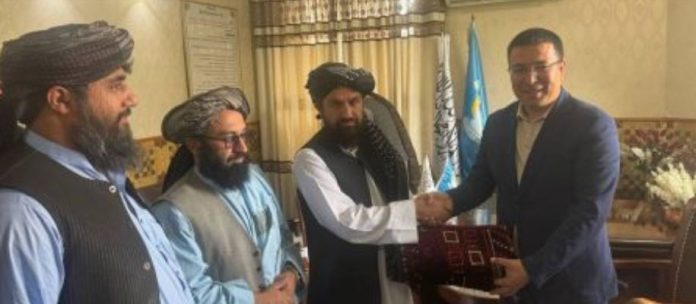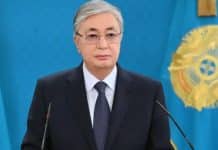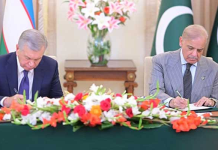Uzbekistan’s current Afghanistan policy appears to be inching toward greater practical cooperation with its “circumstantial” partner, the Taliban government.
In early May, Uzbekistan’s Deputy Minister of Agriculture Jamshid Abduzukhurov and the governor of Afghanistan’s Balkh Province, Haji Muhammad Yusuf Wafa, signed a bilateral agreement concerning the joint management of the Amu Darya water resources, ensuring their fair and rational use. On one hand, this agreement marks a transition to a new phase in the management of transboundary water resources, and on the other hand, it signifies that relations between Uzbekistan and Afghanistan are becoming increasingly institutionalized.
While Uzbekistan has not officially recognized the current government of Afghanistan, its practical steps – including the acceptance of an ambassador appointed by the Taliban, Abdul Ghafoor Bahar – indicate a policy of de facto recognition. This raises an important issue from the perspective of international law and politics: to what extent is it justified and legitimate to conclude legally binding agreements with a political entity that has not been officially recognized?
Ad
Against the backdrop of such legal uncertainty, the signed agreement reflects Uzbekistan’s pragmatic foreign policy and underscores Tashkent’s prioritization of regional interests, based on the recognition of the actual situation in Afghanistan. This approach emphasizes the superiority of practical solutions over ideological considerations in critical matters such as water resources.
Following the Taliban’s return to power, Uzbekistan has repeatedly emphasized the need for a unified and coordinated international strategy toward Afghanistan. Tashkent has articulated this position repeatedly at many international forums, such as the United Nations, the Shanghai Cooperation Organization, and the Organization of Turkic States. Uzbekistan cannot remain a passive observer, since instability in Afghanistan directly impacts its own vital interests. Therefore, Tashkent is compelled to pursue an active and pragmatic foreign policy vis-à-vis Afghanistan, even if it is unilaterally pursued.
Ad
Ad
At the same time, deepening ties with Afghanistan is accompanied with serious challenges. A primary challenge concerns security as terrorist groups, such as Islamic State Khorasan Province and al-Qaida, continue to operate in the country, posing a threat to regional stability. Uzbekistan is compelled to extend its security horizons toward its neighbor in order to make sure its vital interests are intact. In its efforts to combat radicalization, Uzbekistan sees education as a key tool, which is why it Tashkent is funding the construction of madrassas in northern Afghanistan.
The Qosh-Tepa canal project has raised significant concerns in the media, both within Uzbekistan and globally. The 285 km long canal project, currently under construction in Afghanistan, could divert about 25 percent of the Amu Darya’s water, thereby substantially affecting water supplies for Uzbekistan and Turkmenistan. Despite the reported completion of over 80 percent of construction, there are concerns about the canal’s compliance with international standards, as reports have indicated water leakage in certain sections.
Ad
Ad
Regarding international standards and transboundary water use, Afghanistan has disputes not only with Uzbekistan but also with Iran and Pakistan. While the Iran-Afghanistan conflict over the Helmand River seemed to be resolved in early 2025, no official agreements have been signed with Pakistan, despite decades of negotiations. The planned construction of new dams on the Kunar (Gamberi) and Kabul (Shahdud) rivers with India’s support is causing concern in Pakistan due to the potential reduction in water supply, which would impact agriculture and drinking water for millions of people.
The countries in the region have not engaged in a collective effort to resolve water issues with Afghanistan; each is acting independently. Given that the Amu Darya issue is a matter of survival for Uzbekistan, Tashkent has adopted an independent and proactive stance, establishing direct and decisive contact with Afghanistan, without waiting for initiatives from other players.
Ad
Ad
In late March of this year, Uzbekistan’s Minister of Water Resources Shavkat Hamraev stated, “Once the documents are in place, we will take further steps; everything will be resolved through dialogue.”
This has come to pass – Uzbekistan signed a water agreement with Afghanistan without officially recognizing its government.
Here, a logical question may arise: to what extent, given the lack of official status in relations between the government of Uzbekistan and the Taliban, is the agreement credible?
In Uzbekistan’s approach to the conundrum of Afghanistan, pragmatism takes precedence. Within this pragmatic approach, implementation is carried out practically via local inter-regional, inter-ministerial, and inter-agency cooperation. The absence of official recognition of the Taliban government does not mean the absence of formality or a lack of a legal basis when official documents are signed between local authorities and relevant government organizations. The ties between Uzbekistan’s Surkhandarya region and the Afghan province of Balkh, as well as between the cities of Termez and Mazar-i-Sharif, are evidence of this. In Termez, a trade center for Afghan products has been opened, and a Trade House of Uzbekistan is planned for Mazar-i-Sharif.
Ad
Ad
Therefore, contemporary relations between Uzbekistan and Afghanistan go beyond legal and diplomatic recognition, forming a model for so called “limited recognition” based on practical cooperation. This approach enables the development of intersectoral ties even in the absence of official recognition.
In summary, Uzbekistan has chosen a model of practical cooperation, developed consistently through a clear strategy. Although formal recognition has not yet occurred, the republic remains the only regional state striving for an independent solution to the Afghan issue. This highlights that Uzbekistan is not passive; it is acting in accordance with its own national interests.
Ad
If the international community continues to delay the recognition of Afghanistan and fails to adopt a unified stance, the likelihood of Uzbekistan making an independent political decision regarding recognition increases. In such a case, this could trigger a domino effect in the region – similar steps may be taken by other countries actively involved in the Afghan agenda, such as Kazakhstan and Russia.
Uzbekistan’s strategy is not merely a shift in foreign policy but reflects a consistent direction aimed at ensuring regional security, deepening economic integration, and strengthening its leading position in Central Asia. Therefore, Uzbekistan is not only shaping a new platform for political engagement with Afghanistan but also offering the international community an extra option for establishing a working collaboration.

















